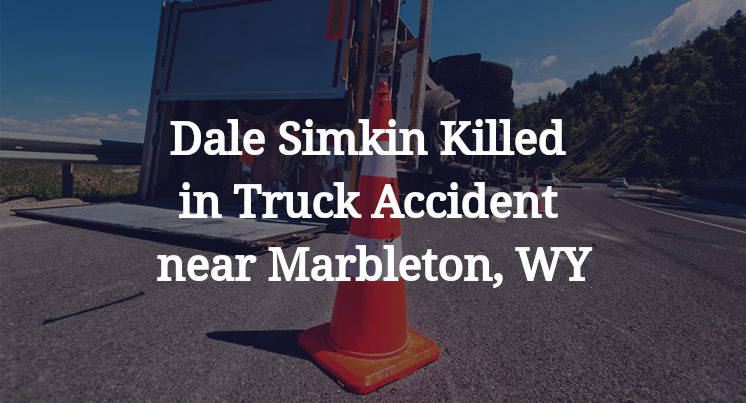Dale Simkin Killed in Truck Accident near Marbleton, WY
Sublette County, WY — June 16, 2025, Dale Simkin was killed in a truck accident at about 12:05 p.m. on State Highway 351 east of Marbleton.
Authorities said a Kenworth semi-truck was headed east when it drifted off the south side of the road near mile marker 8.8. The driver was unable to steer the truck, which was hauling a belly dump trailer, back on to the road and it tipped over, spilling its load of road base. The truck flipped onto the driver's side when it hit a culvert.

Driver Dale Simkin, 37, died in the crash, according to authorities.
Authorities have not released any additional information about the Sublette County crash.
Commentary by Attorney Michael Grossman
When people read about a fatal crash like the one in Sublette County, their first question is usually some version of, “What went wrong?” A truck leaves the road, tips over and someone loses their life. That sequence demands answers, not just for the sake of assigning blame, but to understand what chain of events led to such a tragic outcome and whether it could have been prevented.
In this case, reports say the semi-truck drifted off the road and overturned while hauling a belly dump trailer full of road base. The truck rolled onto its side after hitting a culvert, killing the driver. What we don’t yet know, and what really matters, is why the truck left the road in the first place.
Was it a mechanical failure? Did the load shift or affect the truck’s balance in some way? Was the driver fatigued, distracted or trying to avoid something in the road? Without that information, any conclusions about fault are premature. I've litigated enough of these cases to know that crashes like this aren't always caused by a single moment of inattention. Sometimes they're the end result of a chain of oversights, by the driver, the trucking company or even the people who loaded or maintained the vehicle.
To figure that out, investigators should start with the truck itself. The engine control module, what some call the truck’s “black box," can tell us a lot about what was happening before the crash: speed, brake usage, steering input and more. Dash cameras and in-cab recorders, if available, might show what the driver saw and did. Cell phone records can confirm or rule out distraction. And driver logs or dispatch records can provide insight into how long the driver had been on the road.
Equally important is looking at the company’s role. Did they hire a qualified driver? Was he properly trained to handle the type of trailer he was pulling? Were inspection and maintenance protocols followed? These aren’t side issues; they go to the heart of whether the crash was avoidable.
I’ve handled cases where a driver was set up to fail. One company I went up against had a policy of putting new hires through a brief 20-minute road test before sending them out in 80,000-pound trucks. When that driver crashed, it wasn’t just about her mistake; it was about a system that allowed someone unprepared to take the wheel in the first place.
It’s also worth considering whether the cargo itself played a role. Belly dump trailers carry loose material like gravel or road base, and load distribution matters. If the load was uneven or shifted suddenly, it could’ve contributed to a loss of control. But again, that’s just a possibility until a thorough inspection is done.
At this point, we’re left with more questions than answers. That’s not unusual so early in the process, but it's exactly why independent investigation is essential. Getting to the truth requires evidence, not assumptions.
Key Takeaways:
- The cause of the truck drifting off the road remains unknown; possibilities range from mechanical failure to driver error or cargo issues.
- Investigators should examine ECM data, dash cams, cell records and cargo stability to determine what really happened.
- Trucking company practices — driver vetting, training and maintenance — may be relevant to understanding whether the crash was preventable.
- Loose cargo in belly dump trailers can impact vehicle stability and should be closely examined in rollovers.
- A full investigation is necessary to ensure that accountability goes where it belongs, based on evidence, not guesswork.

“These are essential reads for anyone dealing with the aftermath of a truck wreck”– Attorney Cory Carlson